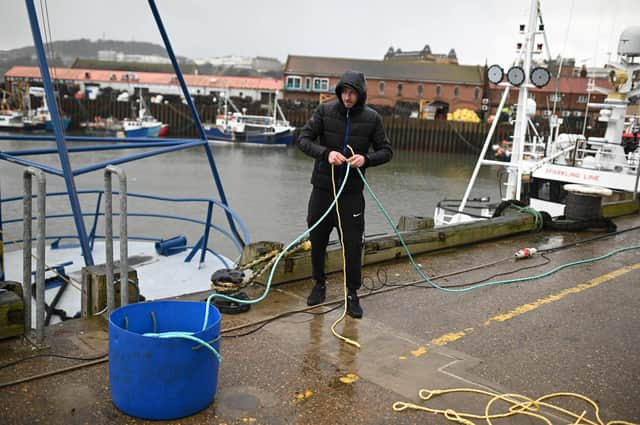Scottish seafood industry could 'grind to halt' over Brexit customs delays


James Withers, chief executive of Scotland Food & Drink, said that ordinary fishing fleets and haulage workers could be forced to cease operations as a result of the knock-on effects of the disruption.
He said the financial impact of such a scenario would be “grave” for many after the “horrendous” year gone by and the “nightmare” sparked by the closure of the French border shortly before Christmas.
Advertisement
Hide AdAdvertisement
Hide AdFishing groups have already stressed that unless action is taken to free up the export process and protect the markets, fleets will be tied up.
Donna Fordyce, chief executive of Seafood Scotland, said the “perfect storm” for exporters” could lead to “the destruction of a centuries-old market” which contributes significantly to the Scottish economy.
Seafood exports bound for European customers have been subject to extensive delays at distribution hubs in the South Lanarkshire town of Larkhall.
Ordinarily, the process of veterinary checks takes between three quarters of an hour and an hour, but haulage firms say they are being forced to wait up to five hours for the necessary paperwork to be processed.
Mr Withers said the industry and authorities were having to adjust to complex new trading rules without having properly tested them, despite warnings of such confusion for months.
Emphasising the need for a “major collective effort” to cut the red tape, he said: “That is critical because the knock-on effect of disruption is significant and can grind the seafood supply chain - from fishing boats to haulage - to a half very quickly.”
Mr Withers said even minor delays could result in “major problems” for those exporting seafood whose value relies on reaching EU markets within 24 hours.
He explained: “There is no doubt that some seafood companies are struggling with the new paperwork requirements, as we knew would be the case. This is slowing the checks that have to be undertaken by law before lorries can be dispatched from Larkhall to the English ports.
Advertisement
Hide AdAdvertisement
Hide Ad“There have also been significant IT problems on the French side of the Channel. This has led to lorries being diverted to different border inspection points and then being held up.”
Mr Withers added: “The French authorities assure us these systems are now fixed but this will need to be closely monitored over the coming days.”
The Scottish Seafood Association, which represents processors, said that instead samples being taken from trucks, entire trailers were being emptied so that entire cargoes could be checked.
Its chief executive, Jimmy Buchan, warned that market prices could become depressed, and said “we are at the point now where the whitefish fleet may have to stop fishing.”
Fergus Ewing, the rural economy secretary, said Food Standards Scotland had the necessary veterinary capacity at distribution hubs, and said the Scottish Government would work closely with businesses and organisations to minimise delays and expedite product journeys.
However, David Duguid, the Scottish Conservative MP for Banff and Buchan, accused the Scottish Government of “hoping for failure” in order to “score political points.”
A message from the editor:Thank you for reading this article. We're more reliant on your support than ever as the shift in consumer habits brought about by coronavirus impacts our advertisers.
If you haven't already, please consider supporting our trusted, fact-checked journalism by taking out a digital subscription.
Comments
Want to join the conversation? Please or to comment on this article.